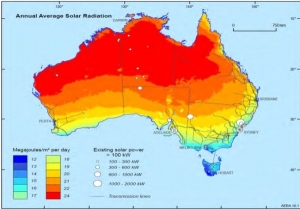As the world looks to Germany as a shining example of how to shift away from polluting coal power, a Queensland-based nuclear expert says solar thermal power is the way forward for Australia.

Paul Wilson, a nuclear engineer with almost five decades’ experience, told ABC Radio Brisbane’s Steve Austin he was disappointed Australia was not showing leadership or innovation in renewables.
“We’re very good in Australia at innovation and at engineering and I think we should take a leaf out of the German book,” he told the Drive program.
“And they’re basically trying to systematically close down their coal mining industry but they’re doing it by replacing jobs.So they’re deliberately setting out, for every job that is lost in coal mining, they’re trying to create another job to create it.”
Germany’s move comes as Australia looks to expand coal exports and build new mines, including the proposed Adani Carmichael project.
Dr Wilson said the answer for Australia lay in the heart of Queensland’s farming regions.
“I think we just build a series of slightly smaller solar thermal power stations down through the inland sort of west of the Darling Downs and going south,”he said.
“Link them all together with a direct current route.”
Dr Wilson is proposing a connected network of concentrated solar power systems (CSPs) that existed a few years ago and was touted as the future of renewables.
That was before a major $650 million project in South Australia was scrapped after it failed to secure funding.
Dr Wilson said there was no reason why the project never came to fruition, aside from its financial woes.
“There is no engineering impediment whatsoever,” he said.«We’ve got more sunlight in Australia than just about any other country. Why aren’t we already a world leader?
“Why aren’t we constructing these things and selling them all around the world?There seems to be some opposition to moving ahead in modern technology and exporting our expertise and our technology.”
Dr Wilson also said CSPs would «absolutely» be able to support Queensland’s third-largest sector, the manufacturing industry.
Another possible option being discussed in the ongoing energy debate is nuclear power, but it is a major sticking point in the upcoming Queensland state election.
Labor has made a clear stand against nuclear power, despite an investigation into its feasibility led by three federal Liberal National Party MPs that found in its favour.
Senator James McGrath, Bundaberg-based MP Keith Pitt and Sunshine Coast MP Ted O’Brien reopened a Federal Government inquiry into nuclear power last August.
The House Standing Committee on the Environment and Energy delivered its findings in December, acknowledging passionate views on both sides of the debate, yet recommending a partial lifting of the moratorium.
It also suggested assessing a new generation of nuclear reactors and examining their feasibility and suitability to Australia.
Dr Wilson described nuclear power as simply «too risky.
“If you look at the fact that we’ve got something like 430 nuclear power stations operating around the world, you work out that over the history we’ve had four total core meltdowns,” he said.
“The chances of having a total core meltdown is about 1 per cent. Are you prepared to take the risk? That’s a very high risk value. In addition to that the likelihood of any form of nuclear accident at a new power station is 22 per cent.”
He also said the cost factor was also a major deterrent from going nuclear.
“It’s not the cost of building it. They are expensive to build and they are expensive to run but it’s the cost of demolition when it gets to the end of its life,” he said.
“We have I think there are 153 mothballed nuclear power stations around the world. We have successfully demolished, out of plain sight, only seven of them. And when you want to demolish a power station you’re talking $100 billion. It’s way beyond the value of the electricity it had produced.”
Queensland’s Minister for State Development, Cameron Dick, ruled out nuclear power as an option.
“The Palaszczuk Government knows that nuclear is not the answer for cheaper power prices,” he said in a statement.
“The safety issues of nuclear power are deadly serious, as Fukushima and Chernobyl showed us. Nuclear is not cheap, it’s not safe, and will be destructive to key Queensland industries like agriculture and tourism.”(By Rebeka Powell)